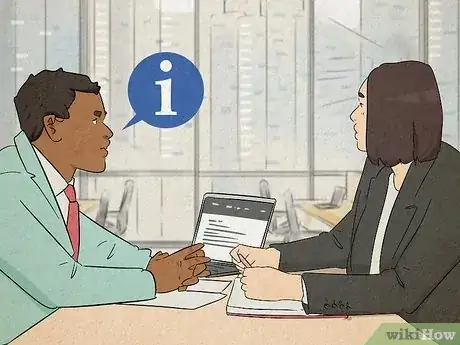This article was co-authored by Jennifer Clark. Jennifer Clark is an Evolution Coach and the Founder of Soulful Solutions, her life consulting business which helps both individuals and organizations evolve and grow into their full potential based in Ottawa, Ontario, Canada. She has over 20 years of experience assisting over 8000 individuals with life consulting, workshop facilitation, and public speaking training. She received a Risk Management Certification from the Sprott School of Business in 2000, an Integrated Energy Therapy Master and Instruction Certificate in 2004, and an Assertiveness Coach Certificate in 2015. She earned a BA with Honors in Political Science from Queen's University in 1992.
There are 7 references cited in this article, which can be found at the bottom of the page.
wikiHow marks an article as reader-approved once it receives enough positive feedback. This article received 16 testimonials and 100% of readers who voted found it helpful, earning it our reader-approved status.
This article has been viewed 471,157 times.
Perhaps you are a manager looking to create a more positive work environment or maybe you are just looking to learn better conflict resolution skills. Diplomacy involves evaluating a situation before speaking or acting and taking the best course of action. While diplomacy can be difficult in certain situations, you can remain poised by being tactful, defusing difficult situations, and building relationships with others.
Things You Should Know
- Choose words carefully and adapt your communication style based on the situation.
- Focus on the facts rather than emotions or opinions.
- Ask open-ended questions to show that you're listening and engaged.
Steps
Communicating Effectively
-
1Choose your words carefully. Remember that though your intentions may be good, sometimes your words might hurt others. Before speaking about a sensitive topic, ask yourself if what you’re about to say is true, helpful and kind. Use “I” statements to describe your own thoughts instead of guessing at what others think or feel.[1]
- For instance, you can say “I’m feeling uncomfortable with the decision made in today’s meeting” instead of “You should be upset about that decision today.”
- Always make statements from your own point of view and perspective.
- Avoid being defensive or blaming others.
- If you need to discuss something serious with someone, practice your words beforehand.
-
2Adapt your communication style based on the situation. Always know your audience before delivering a message. This will help to ensure that it is well received and understood. Determine whether email or in-person communication works best or if news is best delivered in groups or in one-on-one settings.[2]
- For instance, perhaps you need to tell your staff that there will be budget cuts. In the past you may have used email to deliver sensitive information, but have found that caused confusion. Call a staff meeting instead and deliver the facts while providing time for questions.
- Schedule individual meetings as necessary or requested.
Advertisement -
3Be open to new ideas. Instead of always making decisions on your own, listen to the perspectives of others. Thank them for telling you how they feel so that they always feel comfortable doing so. Take time to consider others’ opinions, but stand firm by your own decisions when you feel that you have made the best choice.[3]
- Say “Thank you for your honesty, Jason. I’ll take what you said about universal healthcare into consideration and I’ll do more research.”
-
4Be assertive with your words and body language. When speaking to others, don’t be aggressive, but do be confident. Speak slowly and deliberately. Sit with your legs and arms uncrossed and look people in the eye when they are speaking.[4]
- You should still acknowledge when you don't know something. For example, say, "I'm not sure about that subject and don't know the answer right now, but I'll be sure to look into it further."
-
5Use indirect language. Instead of being overly direct about your thoughts and feelings, add a bit of fluff. Make suggestions instead of telling people what to do. A diplomatic person does not bark out orders, but finds ways to inspire others to action instead.[5] Your goal should be to collaborate with your team and encourage them to do their best.
- For instance, if you are managing a conflict between your children, you might say “You two might want to consider a better way to divide up the space in your room so that you fight less.”
- You can say to an employee who’s often late “Have you considered taking the interstate to work instead? It’s a bit quicker in my experience.” If you choose to say this, say it to someone who you have a good relationship with. It could be perceived as passive-aggressive in some contexts.
-
6Mind your manners. Having good manners is key to diplomacy. Wait your turn to speak and never interrupt others. Be encouraging and avoid hurling insults. Keep your voice at a natural and neutral level and avoid cursing or yelling.[6]
-
7Control your emotions. Perhaps you have to work with people who you really don’t like or whose actions you consider offensive. However, being diplomatic is not just for those you get along with. Practice deep-breathing techniques to calm you when others stress you out. If you feel that you are going to cry or yell, walk away for a moment to use the restroom.[7]
- Consider trying a meditation app such as Insight Timer to help you manage your emotions.
- Alternatively, you could try grounding yourself in the moment. Focus your attention on how your feet feel against the floor or how your buttocks feels against your chair.
Addressing Difficult Situations
-
1Pick a non-stressful time to talk. If you need to have a conversation with someone over something serious, do so when you are both calm. This will help ensure that you can have a reasonable conversation.[8]
-
2Start with a positive comment when giving bad news. Before delivering upsetting information, ease the mood with some positive feedback or news. This will keep the other person calm and establish trust.[9]
- Perhaps you are declining a wedding invitation. Instead of just replying “no,” send a card that says “Congrats on your upcoming wedding! I know it will be a beautiful day. Unfortunately, I have a work event, but I wish you nothing but the best and will mail my gift to you.”
- Be sure to do this when giving constructive criticism, as well.
-
3Focus on the facts of the situation. Before a major talk, consider the facts. You don’t want to enter into conversation relying too much on emotion or opinion, but on reason and logic instead.[10] During your talk, avoid blaming others or becoming defensive. You should not take things personally.
- Perhaps your office is undergoing a restructure. Rather than going to your boss and saying “I don’t like these changes” say “With our department having increased our sales by double in the last quarter, making cuts here will severely affect our ability to make a profit.”
-
4Find ways to compromise with others. Determine both your goal and the goals of others. Think about what you desire to gain as well as what your counterpart wants and look for ways that these interests overlap.[11]
- For instance, perhaps your spouse wants to move so the kids can go to a better school. You might want to stay because it’s close to your office. Consider private schools or moving just one town over.
-
5Express your likes and dislikes to create beneficial situations for everyone. Once you have spoken about each of your objectives, find ways to negotiate. Diplomacy often involves giving up some things so that you can have other things that you desire. Be willing to do so for the sake of compromise and progress.[12]
- Perhaps you are creating a chore list for you and your roommate. You may not mind doing the dishes but hate working outdoors. Perhaps your roommate has the opposite feeling. Offer to take on dish duty in the place of yard work.
-
6React calmly when given bad news. Perhaps your boss tells you that you are being fired or your spouse says they are leaving you. Instead of yelling, hurling insults, or having a meltdown, show maturity through remaining calm. Take several deep breaths in and out. Respond positively and step away as needed to collect yourself.
- For instance, to your boss you might say “I’m very sorry to hear this. Is there a particular reason and is this a final decision?”
- Don't numb out your emotions or escape from them with things like drugs or alcohol. Instead, talk with a friend, engage in a fun activity, or get some exercise. If you are really struggling, see a therapist or counselor.
-
7Speak well of others. When others are gossiping, don’t add fuel to the fire. You might work in a toxic environment where rumors are often spread, but don’t be a part of that. Refraining from gossip shows to others that you have character and integrity.[13]
-
8Be honest and show people your true self. A major element of being diplomatic is being real. When having these tough conversations, it’s vital to be truthful with others. If not, you won’t be able to get what you want and people won’t be able to form genuine relationships with you.[14]
- Maybe you made an error on a project that has affected your team. Instead of shifting blame, say “I made an error on the report and that’s why we’ve been getting so many calls today. I apologize and I’m working to fix it. Let me know if you all have questions or need help.”
-
9Take a step back from the conversation. Avoid making difficult decisions on the spot. Instead of making decisions that you’ll regret, walk away for a moment to think.[15]
- For instance, you might be a supervisor working with an employee who is asking to work from home one day a week. Before saying ‘no’ immediately, consider their needs and reasoning. Find a way to compromise if possible and offer this flexibility to other staff as well.
Building Rapport with Others
-
1Make small talk to create comfort. A major part of diplomacy is helping others feel comfortable with you. Instead of jumping right into a serious talk, establish a level of friendliness with others. Talk about each other's weekends, spouses, kids or hobbies. Discuss the latest news or TV shows that you’re watching. Help them feel at ease by showing your interest in their lives.[16]
- Inject humor where you can.
-
2Mirror their body language. Show empathy for them by mimicking their gestures and posture. If they are sitting with their hand resting under their chin, do the same. This shows that you are engaged in the conversation.[17]
- Smile at them when you see them at first, as well.
-
3Use their name in conversation. People often respond positively to the use of their own name. Every so often, use their name while you’re talking.[18]
- It can be something simple like “Where would you like to have lunch, Kyle?” or something more serious like “Andrea, I’m so sorry to hear about your mother.”
-
4Be an attentive listener. When having a talk with someone, avoid using your phone or daydreaming. Instead, actively listen to them so that you can understand their perspective. Relay back what they said to you to prove that you hear them.[19]
- For instance, you might say “It sounds like having to take care of your mother and your small child is really taking a toll on your health.”
-
5Ask them questions. Show that you’re listening to them by learning more about what they’re discussing. Ask them open-ended questions that require thought and more than a ‘yes’ or ‘no’ answer.[20]
- Ask something like “Wow, you went to Greece? What made you decide to go there and what did you like best?”
Expert Q&A
Did you know you can get expert answers for this article?
Unlock expert answers by supporting wikiHow
-
QuestionWhat are the diplomatic skills?
 Trudi Griffin, LPC, MSTrudi Griffin is a Licensed Professional Counselor in Wisconsin specializing in Addictions and Mental Health. She provides therapy to people who struggle with addictions, mental health, and trauma in community health settings and private practice. She received her MS in Clinical Mental Health Counseling from Marquette University in 2011.
Trudi Griffin, LPC, MSTrudi Griffin is a Licensed Professional Counselor in Wisconsin specializing in Addictions and Mental Health. She provides therapy to people who struggle with addictions, mental health, and trauma in community health settings and private practice. She received her MS in Clinical Mental Health Counseling from Marquette University in 2011.
Professional Counselor
-
QuestionIs it good to be diplomatic?
 Trudi Griffin, LPC, MSTrudi Griffin is a Licensed Professional Counselor in Wisconsin specializing in Addictions and Mental Health. She provides therapy to people who struggle with addictions, mental health, and trauma in community health settings and private practice. She received her MS in Clinical Mental Health Counseling from Marquette University in 2011.
Trudi Griffin, LPC, MSTrudi Griffin is a Licensed Professional Counselor in Wisconsin specializing in Addictions and Mental Health. She provides therapy to people who struggle with addictions, mental health, and trauma in community health settings and private practice. She received her MS in Clinical Mental Health Counseling from Marquette University in 2011.
Professional Counselor
-
QuestionWhat is an example of diplomacy?
 Trudi Griffin, LPC, MSTrudi Griffin is a Licensed Professional Counselor in Wisconsin specializing in Addictions and Mental Health. She provides therapy to people who struggle with addictions, mental health, and trauma in community health settings and private practice. She received her MS in Clinical Mental Health Counseling from Marquette University in 2011.
Trudi Griffin, LPC, MSTrudi Griffin is a Licensed Professional Counselor in Wisconsin specializing in Addictions and Mental Health. She provides therapy to people who struggle with addictions, mental health, and trauma in community health settings and private practice. She received her MS in Clinical Mental Health Counseling from Marquette University in 2011.
Professional Counselor
Warnings
- Be careful with the use of the word "No." You should try to listen well to others' point of view and agree that you understand their point of view, though not necessarily agreeing with what they said.⧼thumbs_response⧽
References
- ↑ https://hbr.org/2014/06/choose-the-right-words-in-an-argument
- ↑ https://us.experteer.com/magazine/adapting-communication-styles-for-every-situation/
- ↑ https://www.forbes.com/sites/davidkwilliams/2013/01/07/the-5-secret-tricks-of-great-people-how-to-become-open-minded-in-2013/#691e64f673d4
- ↑ https://www.skillsyouneed.com/ips/tact-diplomacy.html
- ↑ http://www.quickanddirtytips.com/business-career/public-speaking/how-to-be-more-diplomatic?page=1
- ↑ https://www.mindtools.com/pages/article/tactful.htm
- ↑ https://www.mindtools.com/pages/article/tactful.htm
- ↑ https://www.mindtools.com/pages/article/tactful.htm
- ↑ https://www.mindtools.com/pages/article/tactful.htm
- ↑ https://www.skillsyouneed.com/ips/tact-diplomacy.html
- ↑ https://www.skillsyouneed.com/ips/tact-diplomacy.html
- ↑ https://www.skillsyouneed.com/ips/tact-diplomacy.html
- ↑ https://www.mindtools.com/pages/article/tactful.htm
- ↑ https://www.mindtools.com/pages/article/tactful.htm
- ↑ http://www.quickanddirtytips.com/business-career/public-speaking/how-to-be-more-diplomatic?page=1
- ↑ https://www.skillsyouneed.com/ips/rapport.html
- ↑ https://www.skillsyouneed.com/ips/rapport.html
- ↑ https://www.skillsyouneed.com/ips/rapport.html
- ↑ https://www.skillsyouneed.com/ips/tact-diplomacy.html
- ↑ https://www.skillsyouneed.com/ips/rapport.html
About This Article
If you want to communicate in a more diplomatic way, be careful about how you phrase your statements. Try to make it clear that you are giving your opinion by using “I” statements. For example, say things like, “I don’t like what you said to me” instead of assuming it was meant as an insult. You should also try to be less direct by asking people if they have considered other options, instead of telling them to do it your way. For advice from our reviewer on dealing with difficult situations, read more!




















































































